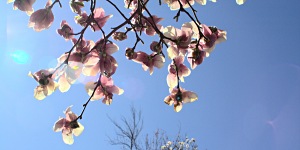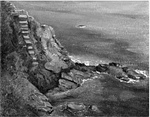TIME AND SPACE IN BOGLIASCO, ITALY
CHARLES BUKOWSKI WROTE A POEM called Air and Light and Time and Space in which he rages against the excuses proffered by people who want to create but are always finding reasons why they cannot. He declares with singular passion that if you’re serious about it you’ll be able to create under any circumstances, such as working in the coal mines 16 hours a day, or ignoring a cluster of (your own) small children weeping in the corner, or howling at cats crawling up your back, or left with only parts of your mind and body while trying to keep upright as the earth shifts under your feet.
Personally, I have not found this to be true, although I can accept it might have been true for him. For the rest of us who are worn down by the cares of daily life, like the erosive drip of water on stone, a little uninterrupted air, light, time and space to devote to one’s art could be the absolutely perfect thing.
One doesn’t think of Palisadian Joan Hooker as a person looking for excuses, because of course, she isn’t. She has an illustrious career as a painter, publisher and benefactor. She has already demonstrated her ability to work under difficult conditions, if not as drastic as the ones Bukowski describes, and although she lives in our beautiful hamlet rife with artists and other creators, she can testify to the immense gift conferred by a respite away from the usual and its effect on her work.
The gift came to her this past October in the form of a fellowship at the Bogliasco Foundation in the Liguria region of Italy, where she painted on the sunlit shores of the Mediterranean for an entire month. Bogliasco, a fishing village located at the foot of the Apennines, is very like the river side of Palisades where Joan lives, in that a mountainous terrain isolates the village from inland and forces one to face outward over water to the larger world. The nearby port of Genoa has an ancient history of rich cultural exchange through seafaring, its dialect being a mix of Portuguese and Arabic. Street signs in the hills are still in both languages, Italian and Genoan. It is this cosmopolitan history that in part informs the mission of the foundation.
The Bogliasco Foundation, a non-profit supported largely by private donations, was founded in 1991 by the Biaggi family. Its mission is to support artists and humanities scholars of notable achievement who are seeking to understand our place in the world by shaping and defining what it means to be human. To this end, the foundation provides the time and space while Liguria provides the air and the light. The foundation believes strongly in the cross-pollination of disciplines. It forms for each residency period, groups of fellows expert in architecture, music, literature, dance and history, who daily interact in a superb but informal setting.
The foundation’s grounds are made up of three adjoining villas once the childhood home of Palisadians Marina Biaggi Harrison, Cristina Biaggi and their brother Gianni Biaggi de Blasys of Lausanne, each of whom is an accomplished artist in his and her own right. When their father, Leo Biaggi de Blasys, an industrialist with a passion for the arts, died, his children decided to commemorate him with the foundation.
Marina’s husband James Harrison, a noted musician and theorist, set up the legal structure, toured well-established retreats such as The Rockefeller Foundation, Yaddo, and the McDowell Colony to understand what an optimal work space entailed, and without changing a single detail of the exterior to comply with historic preservation standards, updated the plumbing and wiring of the villas, added Wi-Fi, installed floors for dance studios, improved acoustics, and while adhering to the philosophy of simplicity, comfort and efficiency, provided every modern amenity conducive to the nurturing of the creative spirit. The first fellows were welcomed in 1996. Since then over 900 fellows from all over the world have graduated the program.
The Foundation has formed partnerships with the Baryshnikov Arts Center, The Aaron Copeland Foundation, The Genoa International Poetry Festival, and La Compagnia di San Paolo, among others. In 2007, the Bogliasco Foundation received the Grifo D’Oro, Genoa’s highest honor in recognition of the organization’s support of humanistic disciplines.
Joan, who speaks Italian and has an extensive background in Italian literature, was assigned rooms designed to immerse her in the constantly inspiring landscape. She spent each day in brilliant weather painting en plein air on her balcony overlooking the water, or talking to the local fishermen as they mended their nets, or visiting the many cultural sites of Genoa.
Her group included a choreographer, a Turkish composer, a UK novelist, an American historian, a Chinese videographer and a Polish Sephardic language scholar. English was their common language. They have stayed in touch. “Bonds were made,” she said. She left not only with new colleagues, but with a new level of inspiration from which she is reconsidering size, scope and direction in her work.
Who can doubt that Bukowski would have taken his share of air, light, time and space if it had been afforded him? Are they necessary? Maybe not. Are they excuses? Surely not. They are a gift from the muses.
For more information on the Bogliasco Foundation, go to www.bfny.org.


